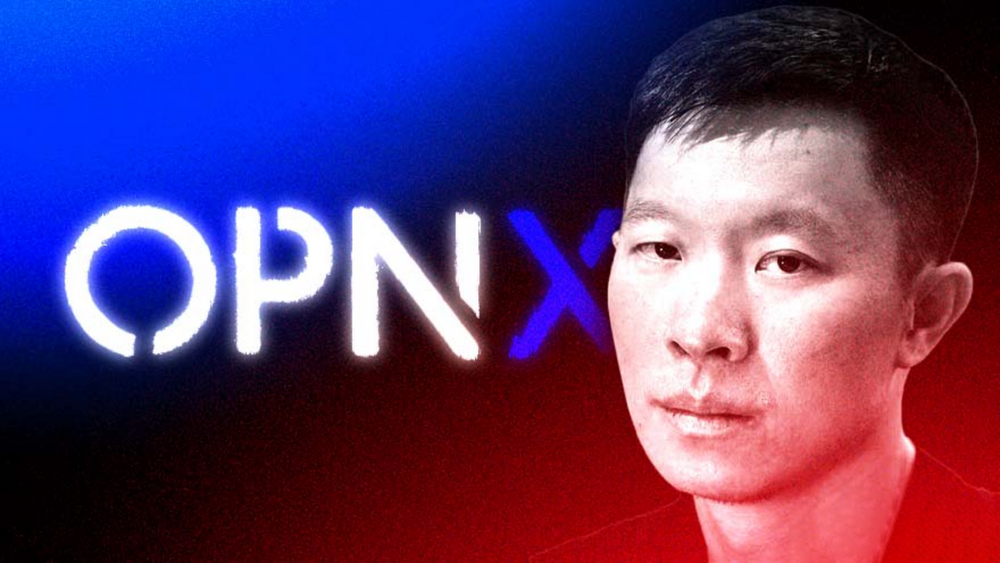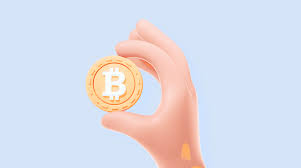11 blockchain companies have become global unicorns! Is it still time to get off the train?
Author: Joyce
Source: blockchain outpost
Today, Hurun released the "2019 Hurun Global Unicorn List" for the first time. The list shows that financial technology accounts for 22% of the global market value of unicorn companies, and the blockchain industry is also famous for its 2% market capitalization. There are 11 blockchain companies on the list, namely:
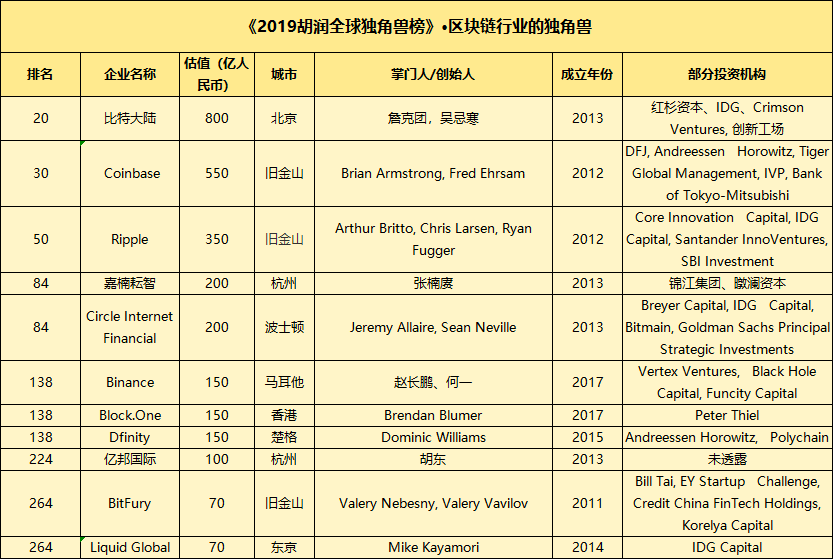
- Read the Bloomberg Beta, how the $250 million fund is deployed in the blockchain industry.
- "Focus on the AI era": 2019 The world's first AI era mining ecological summit ended successfully
- The total market value of 11 blockchain unicorns is 269 billion. Will stable coins and DeFi be the new unicorns?
Not long ago, the American science magazine Science American incorporated blockchain technology into the 2019 top breakthrough technology list. Blockchain technology has become a star technology favored by mainstream companies and investors, and major companies at home and abroad have begun to exert their power in the blockchain.
At present, the blockchain has begun to play an important role in international trade, supply chain management, anti-counterfeiting traceability, and data storage.
Blockchain technology originated from the geek community, so the advancement of the technology field at the beginning of development has surpassed the commercial exploration, but as its application has become more widespread, its commercial value has been slowly explored.
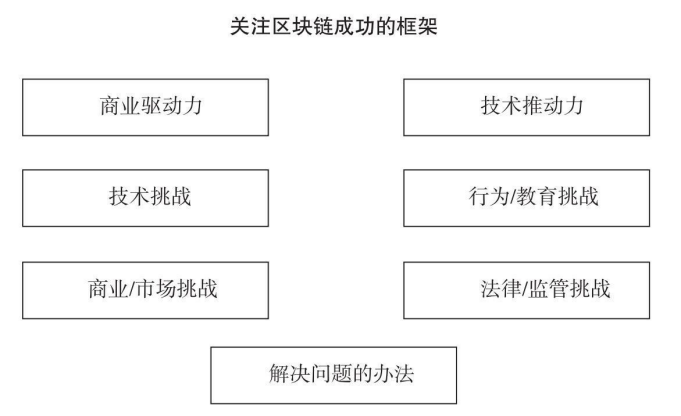
At present, big companies such as Alibaba, Baidu, and Tencent are all making efforts in the blockchain and making arrangements. In this regard, Kong Qingyang, a project marketing director, told InfoQ: “In order to enter a large company, we are also very happy to see it as a startup company, because the giants can use their rich resources to explore in areas that small teams cannot try , such as the government. Institutions, large state-owned enterprises, judicial, and medical systems. We also expect giants to apply blockchain technology in these areas, creating sparks and creating new business models."
But in the face of competition, startups also have their own advantages. Kong Qingyang said that the advantage of the startup company is that it has stronger innovation ability and will be closer to the market. There is a lot of segmentation in a big market. The bigger the market, the richer the niche market. In this respect, if the startup finds that the opportunity is easy to focus on resources, and the giants may be more to upgrade their own strength based on their own systems, the two strategies are different.
Kong Qingyang said that the blockchain is a data governance tool that needs to be implemented after highly informatized. The prerequisite for its use in an industry is that the industry itself is highly informative. For example, the concept of “transaction and settlement” in the blockchain can be applied to many scenarios such as clearing, over-the-counter, supply chain finance, and DVP.
Investor William Mougayar once said, “The blockchain will be 80% of business process changes and 20% of technology implementation.” In the blockchain commercialization process, it is important to understand the customer's business processes and find the point of integration. .
However, the current Internet information technology is mainly used in the C-side application, and the popularity of the B-side is still relatively low. Therefore , the cost of the blockchain technology on the B-side will be relatively high, which is also the commercial era of the blockchain. A big obstacle.
The blockchain has no past examples to follow, it is not a completely new product. The blockchain as a whole can be considered as a combination of database, development platform and network implementation. Therefore, we need many forms and changes in it. In the specific application, it can take many forms. For example, blockchain can be viewed as a credit center, trading medium, secure channel, decentralized function, and so on.
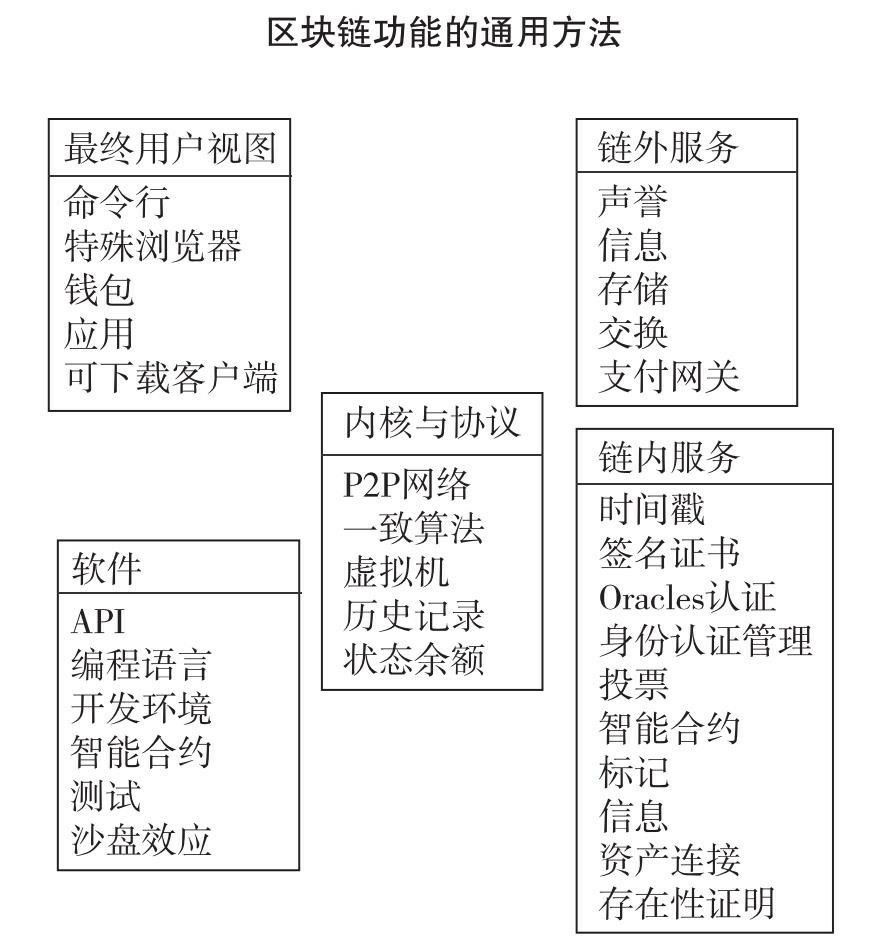
Let's take an enterprise-level blockchain kernel as an example to see how blockchain technology can serve different users. In order to allow the user to have more operation space, the function of the blockchain is divided into six modules on the overall architecture, and each module can be operated in a micro service mode, and the modules are connected by a message bus. In this way, the user only needs to rewrite the consensus module without changing the overall architecture. At the same time, different services are placed in different hardware environments, and resources can be flexibly increased and reduced to match different business volumes.
The evaluation of the blockchain platform can be performed in terms of programmability, scalability, scalability, transaction manageability, security, speed and performance, and interoperability. So, how exactly does the blockchain work in a specific scenario?
Taking the supply chain as an example, the application of the blockchain in the supply chain is carried out in a multi-participation scenario. Data consistency, security, and non-destructive modification ensure data security and convenience. Among them, the consistency is reflected in the fact that in a supply chain financial system, the core enterprises, banks and upstream suppliers need to ensure that the data held is consistent. The right to be reflected in the ownership of data can not only be falsified, but also easily changed by normal. For example, in supply chain finance, accounts receivable are the suppliers that core enterprises send to themselves, but in the traditional model, it is more difficult for accounts receivable credits to flow from core enterprises to upstream suppliers. In the blockchain, the characteristics of receivables that can be certified make the whole process easier. Non-destructible modification reduces the possibility of multi-use.
While large companies are using blockchain technology, one thing before a company decides to adopt blockchain technology is to be clear about whether it meets its strategic needs. One of the cheaper things brought by blockchain technology is information sharing, but is your information sensitive? What is the level of data disclosure? These are all factors that need to be considered. Blockchain is not a technology that can be used in any scenario.
Kong Qingyang said that blockchain companies generally choose a certain field and combine blockchain technology with this scenario. Therefore, when a “Xiaobai” company decides to introduce blockchain technology, it should find a blockchain supplier under the corresponding ecology, consult with a number of companies with their own core technologies, and learn more from a number of companies. Choose the right supplier for you.
In terms of cost, if the enterprise implements its own business logic through the blockchain, it may need to be privatized. This cost is relatively high. If you only want to cure and deposit your own data, you can do it simply and at a relatively low cost.
In terms of revenue, because the decision-making cycle of the B-side is long, the project promotion will not be too fast, and the use and structure of the blockchain itself is quite different from the traditional centralized system. It requires long-term investment to help the enterprise create suitable applications. This process may take half a year, one year or even two years. In this case, it is not realistic to get a quick return.
Therefore, companies need to evaluate their own aspects and then decide whether to use blockchain technology. Blindly following the trend may lead to unnecessary losses.
Although the blockchain technology is more oriented to the B-end users, it is difficult for ordinary consumers to feel the changes brought by the blockchain, but the blockchain enterprises are also developing and progressing.
Now, with the enthusiasm of a company with a valuation of 80 billion yuan, in the future, everything can be expected.
Editor's Note: This article does not change the original intention of the author.
We will continue to update Blocking; if you have any questions or suggestions, please contact us!
Was this article helpful?
93 out of 132 found this helpful
Related articles
- Operation Guide: How to buy and sell Dai on OTC on imToken
- Babbitt column | Digital currency relative valuation method
- Li Lihui, former president of Bank of China: Digital currency, another restructuring of the monetary system
- The US group is ten years old, or is it no longer outside the blockchain?
- Bitcoin offline payments are now available via Lightning Network
- Libra or a stable currency that anchors a single currency, not a basket of currencies
- Li Lin: 5G, Internet of Things, AI and blockchain will become the new accelerators of the digital economy

